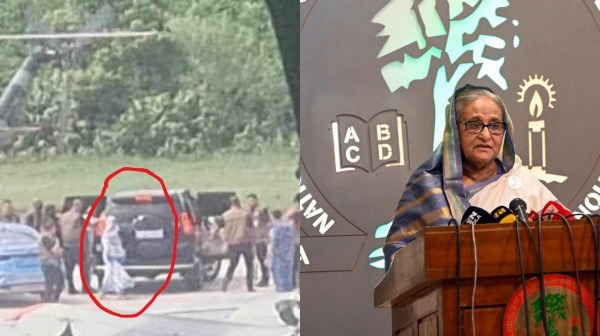Sheikh Hasina’s Departure Amid Crisis

Bangladesh’s Prime Minister, Sheikh Hasina, has resigned and fled the country after weeks of escalating protests that have left nearly 300 people dead. Hasina, 76, and her sister were reported to have flown to India on a military helicopter, seeking refuge amidst the chaos that has engulfed the nation. The departure of the long-time leader marks a significant turning point in Bangladesh’s political landscape.
The Exodus to India
According to media reports, Sheikh Hasina’s helicopter landed in the eastern Indian state of West Bengal, although other sources indicate that she might be heading towards Tripura, another northeastern state in India. This sudden move comes as thousands of protesters stormed her official residence, chanting slogans and celebrating her resignation. The scenes of jubilation on the streets of Dhaka reflect the public’s relief and the end of Hasina’s 15-year rule.
The Military’s Role in the Crisis
General Waker-Uz-Zaman’s Address
In the wake of Hasina’s resignation, Bangladesh’s army chief, General Waker-Uz-Zaman, addressed the nation, promising a resolution to the crisis by nightfall. He assured the public of his commitment to form an interim government in consultation with the president and emphasized that the military would stand down. General Zaman also announced an investigation into the deadly crackdowns that have intensified public outrage.
Deadly Crackdowns and Nationwide Protests
The protests, which began over a month ago, were initially sparked by student activists demanding the abolition of a controversial quota system in government jobs. The situation quickly escalated into a broader campaign against Hasina’s government, culminating in widespread violence. Nearly 300 people have been killed in clashes between protesters and security forces, with the most intense violence occurring in recent days.
Reactions and Statements
Official Statements and Reactions
Officials from the Bangladesh High Commission in Delhi confirmed Hasina’s resignation and departure, adding that she had been taken to a “safe shelter” away from her official residence. Law Minister Anisul Huq expressed uncertainty about the unfolding events, stating, “You see, the situation is very volatile. What is happening, I myself don’t know.”
Continued Protests and Curfew
Despite a nationwide curfew imposed on Sunday evening, student activists called for a march on Dhaka, demanding Hasina’s resignation. Armored personnel carriers and troops patrolled the capital’s streets, but protests continued in various parts of the city. Reports from local media indicated that at least six people were killed in clashes between police and protesters on Monday.
The Future of Bangladesh’s Government
Interim Government Plans
General Waker-Uz-Zaman is in discussions with key stakeholders outside the military to form an interim government. His address to the nation, initially scheduled for 2 pm local time, was delayed to accommodate these critical talks. The military’s spokesperson urged the public to remain patient and refrain from violence until the army chief’s official statement.
Historical Context and Election Boycott
The current crisis in Bangladesh has deep historical roots, with underlying tensions exacerbated by the recent controversial election. Hasina’s fourth consecutive term in office, won in January, was marred by an opposition boycott and allegations of electoral fraud. The protests that followed were a culmination of long-standing grievances against her government.
Conclusion
Bangladesh stands at a crossroads, with its political future hanging in the balance. The resignation and flight of Prime Minister Sheikh Hasina mark a dramatic shift, as the nation grapples with the aftermath of deadly protests and widespread unrest. The coming days will be crucial as the military and political leaders navigate the path towards stability and the formation of a new government.

